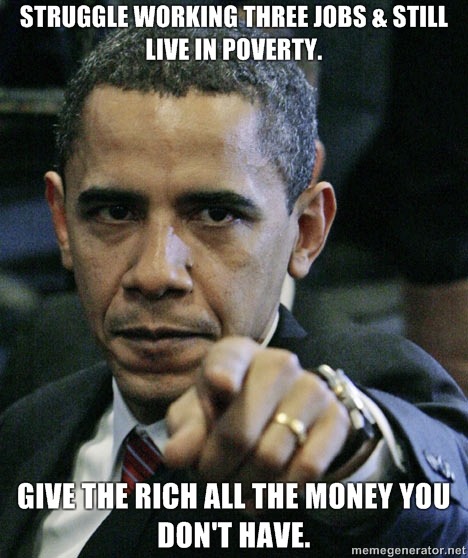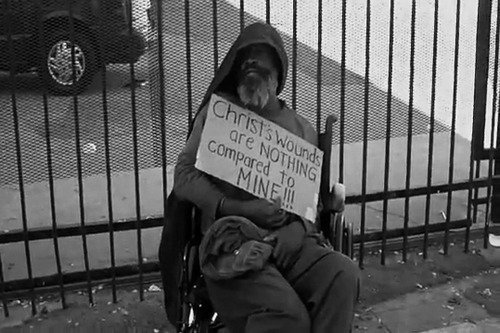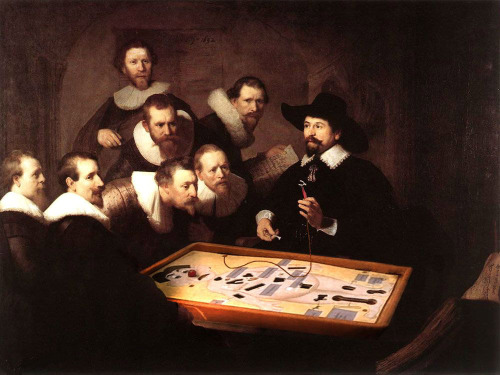
maandag 31 januari 2011
zondag 30 januari 2011
Carlos Fuentes, Todas las familias felices
Julia era buena por conveniencia, porque queria irse al cielo, cuando en realidad la gente buena es la mas numerosa poblacion del infierno. Ser bondadosa puede engañar a Dios pero no al Diablo.
(p. 388, en el cuento "El padre eterno")
(p. 388, en el cuento "El padre eterno")
zaterdag 29 januari 2011
Money / happiness
Money can't buy you happiness, but it does bring you a more pleasurable form of misery.
Spike Milligan
Spike Milligan
vrijdag 28 januari 2011
The Anti-Social Network
By helping other people look happy, Facebook is making us sad.
By Libby CopelandPosted Wednesday, Jan. 26, 2011, at 4:51 PM ET There are countless ways to make yourself feel lousy. Here's one more, according to research out of Stanford: Assume you're alone in your unhappiness.
There are countless ways to make yourself feel lousy. Here's one more, according to research out of Stanford: Assume you're alone in your unhappiness. "Misery Has More Company Than People Think," a paper in the January issue of Personality and Social Psychology Bulletin, draws on a series of studies examining how college students evaluate moods, both their own and those of their peers. Led by Alex Jordan, who at the time was a Ph.D. student in Stanford's psychology department, the researchers found that their subjects consistently underestimated how dejected others were–and likely wound up feeling more dejected as a result. Jordan got the idea for the inquiry after observing his friends' reactions to Facebook: He noticed that they seemed to feel particularly crummy about themselves after logging onto the site and scrolling through others' attractive photos, accomplished bios, and chipper status updates. "They were convinced that everyone else was leading a perfect life," he told me.
The human habit of overestimating other people's happiness is nothing new, of course. Jordan points to a quote by Montesquieu: "If we only wanted to be happy it would be easy; but we want to be happier than other people, which is almost always difficult, since we think them happier than they are." But social networking may be making this tendency worse. Jordan's research doesn't look at Facebook explicitly, but if his conclusions are correct, it follows that the site would have a special power to make us sadder and lonelier. By showcasing the most witty, joyful, bullet-pointed versions of people's lives, and inviting constant comparisons in which we tend to see ourselves as the losers, Facebook appears to exploit an Achilles' heel of human nature. And women—an especially unhappy bunch of late—may be especially vulnerable to keeping up with what they imagine is the happiness of the Joneses.
In one of the Stanford studies, Jordan and his fellow researchers asked 80 freshmen to report whether they or their peers had recently experienced various negative and positive emotional events. Time and again, the subjects underestimated how many negative experiences ("had a distressing fight," "felt sad because they missed people") their peers were having. They also overestimated how much fun ("going out with friends," "attending parties") these same peers were having. In another study, the researchers found a sample of 140 Stanford students unable to accurately gauge others' happiness even when they were evaluating the moods of people they were close to—friends, roommates and people they were dating. And in a third study, the researchers found that the more students underestimated others' negative emotions, the more they tended to report feeling lonely and brooding over their own miseries. This is correlation, not causation, mind you; it could be that those subjects who started out feeling worse imagined that everyone else was getting along just fine, not the other way around. But the notion that feeling alone in your day-to-day suffering might increase that suffering certainly makes intuitive sense.
Advertisement
As does the idea that Facebook might aggravate this tendency. Facebook is, after all, characterized by the very public curation of one's assets in the form of friends, photos, biographical data, accomplishments, pithy observations, even the books we say we like. Look, we have baked beautiful cookies. We are playing with a new puppy. We are smiling in pictures (or, if we are moody, we are artfully moody.) Blandness will not do, and with some exceptions, sad stuff doesn't make the cut, either. The site's very design—the presence of a "Like" button, without a corresponding "Hate" button—reinforces a kind of upbeat spin doctoring. (No one will "Like" your update that the new puppy died, but they may "Like" your report that the little guy was brave up until the end.) Any parent who has posted photos and videos of her child on Facebook is keenly aware of the resulting disconnect from reality, the way chronicling parenthood this way creates a story line of delightfully misspoken words, adorably worn hats, dancing, blown kisses. Tearful falls and tantrums are rarely recorded, nor are the stretches of pure, mind-blowing tedium. We protect ourselves, and our kids, this way; happiness is impersonal in a way that pain is not. But in the process, we wind up contributing to the illusion that kids are all joy, no effort.
Facebook is "like being in a play. You make a character," one teenager tells MIT professor Sherry Turkle in her new book on technology, Alone Together. Turkle writes about the exhaustion felt by teenagers as they constantly tweak their Facebook profiles for maximum cool. She calls this "presentation anxiety," and suggests that the site's element of constant performance makes people feel alienated from themselves. (The book's broader theory is that technology, despite its promises of social connectivity, actually makes us lonelier by preventing true intimacy.)
Facebook oneupsmanship may have particular implications for women. As Meghan O'Rourke has noted here in Slate, women's happiness has been at an all-time low in recent years. O'Rourke and two University of Pennsylvania economists who have studied the male-female happiness gap argue that women's collective discontent may be due to too much choice and second-guessing–unforeseen fallout, they speculate, of the way our roles have evolved over the last half-century. As the economists put it, "The increased opportunity to succeed in many dimensions may have led to an increased likelihood in believing that one's life is not measuring up."
If you're already inclined to compare your own decisions to those of other women and to find yours wanting, believing that others are happier with their choices than they actually are is likely to increase your own sense of inadequacy. And women may be particularly susceptible to the Facebook illusion. For one thing, the site is inhabited by more women than men, and women users tend to be more active on the site, as Forbes has reported. According to a recent study out of the University of Texas at Austin, while men are more likely to use the site to share items related to the news or current events, women tend to use it to engage in personal communication (posting photos, sharing content "related to friends and family"). This may make it especially hard for women to avoid comparisons that make them miserable. (Last fall, for example, the Washington Post ran a piece about the difficulties of infertile women in shielding themselves from the Facebook crowings of pregnant friends.)
Jordan, who is now a postdoctoral fellow studying social psychology at Dartmouth's Tuck School of Business, suggests we might do well to consider Facebook profiles as something akin to the airbrushed photos on the covers of women's magazine. No, you will never have those thighs, because nobody has those thighs. You will never be as consistently happy as your Facebook friends, because nobody is that happy. So remember Montesquieu, and, if you're feeling particularly down, use Facebook for its most exalted purpose: finding fat exes.
dinsdag 25 januari 2011
zondag 16 januari 2011
vrijdag 7 januari 2011
Husband lends his wife to a gorilla
A man and his wife were spending the day at the zoo. She was wearing a loose fitting, pink dress, sleeveless with straps. He was wearing his usual jeans and T-shirt. As they walked through the ape exhibit, they passed in front of a large, silverback gorilla. Noticing the wife, the gorilla went crazy. He jumped on the bars, and holding on with one hand and 2 feet, he grunted and pounded his chest with his free hand. He was obviously excited at the pretty lady in the pink dress. The husband, noticing the excitement, thought this was funny.
He suggested that his wife tease the poor fellow some more by puckering her lips and wiggling her bottom. She played along and he gorilla got even more excited, making noises that would wake the dead.
Then the husband suggested that she let one of her straps fall to show a little more skin. She did... And the gorilla was about to tear the bars down. "Now... Show your thighs and sort of fan your dress at him," he said. This drove the gorilla absolutely crazy, and he started doing flips.
Then the husband grabbed his wife, ripped open the door to the cage, flung her in with the gorilla and slammed the cage door shut.
"Now. Tell him you have a headache."
He suggested that his wife tease the poor fellow some more by puckering her lips and wiggling her bottom. She played along and he gorilla got even more excited, making noises that would wake the dead.
Then the husband suggested that she let one of her straps fall to show a little more skin. She did... And the gorilla was about to tear the bars down. "Now... Show your thighs and sort of fan your dress at him," he said. This drove the gorilla absolutely crazy, and he started doing flips.
Then the husband grabbed his wife, ripped open the door to the cage, flung her in with the gorilla and slammed the cage door shut.
"Now. Tell him you have a headache."
CEO vs shredder
A young executive was leaving the office at 6 p.m. when he found the CEO standing in front of a shredder with a piece of paper in hand.
“Listen,” said the CEO, “this is important, and my secretary has the holiday week off. Can you make this thing work?”
“Certainly,” said the young executive. He turned the machine on, inserted the paper, and pressed the start button.
“Excellent, excellent…” said the CEO as his paper disappeared inside the machine. “I just need one copy.”
woensdag 5 januari 2011
ENTREVISTA: MAX OTTE Economista y director del Instituto Patrimonial de Colonia "Puede que estemos ante una eterna burbuja económica"
Max Otte (Plettenberg, Alemania, 1964) se convirtió en 2008 en uno de esos gurús que llevaban tiempo advirtiendo sobre el fin del que entonces se antojaba un ciclo de crecimiento inacabable. Pero eso ya queda atrás, y lo que denuncia ahora es la vuelta a un capitalismo que considera "feudal". Su libro El crash de la información (Ariel), que ha presentado esta semana en el Consejo Audiovisual de Cataluña, destila indignación ante el rescate de los grandes bancos con dinero público o la desinformación a la que, a su juicio, las grandes corporaciones someten al consumidor. Podría parecer un enemigo acérrimo del capitalismo, pero no lo es. Doctorado en Princeton, hoy dirige el Instituto de Desarrollo Patrimonial de Colonia y es gestor independiente de fondos.
Pregunta. Tras la quiebra de Lehman Brothers se hablaba de "refundación del capitalismo". ¿Dónde ha quedado aquello?
Respuesta. No queda nada de eso. ¿Qué capitalismo hemos tenido en los últimos 10 o 20 años? Yo lo llamo nuevo feudalismo. Quienes más influencia han tenido en la sociedad han sido las grandes empresas, en lugar de los políticos, que se han quedado sin apenas poder. Una economía de mercado real debería estar controlada por los mercados, y ha estado planificada por las grandes corporaciones. Y los Estados han trabajado para ellas en vez de servir a sus ciudadanos. Lo vemos en la actual crisis europea, en la que estamos salvando a los bancos. La gente de Grecia o Irlanda, pero también de Alemania, está pagando para que los bancos sean salvados.
P. ¿Esta crisis es un ataque contra el euro?
R. Yo estoy en contra del euro. No lo estoy del sistema monetario europeo que teníamos antes. Es decir, tipos de cambio fijos, pero monedas nacionales. No necesitamos el euro para una integración económica.
P. ¿Eso no debilitaría todavía más Europa?
R. En absoluto, no creo que se viniera abajo. Podríamos seguir siendo una comunidad económica volviendo a las monedas nacionales.
P. La canciller alemana Angela Merkel dijo que en realidad no se trata de salvar al euro, sino a Europa.
R. No estoy de acuerdo. Europa y el euro no son lo mismo. El euro creó esta crisis, y Europa puede ser mejor sin la moneda única.
P. ¿El euro resistirá?
R. Desearía que no lo hiciera, pero nadie dejará que se venga abajo. Los políticos europeos, también los alemanes, están saliendo a defenderlo. Y además, en general, Europa lo está haciendo mejor que Estados Unidos, que es quien tiene el problema. Su déficit es alto, del 11%...
P. Pero los mercados castigan la deuda de los países europeos. Primero fue Grecia; luego, Irlanda. ¿Le seguirá Portugal?
R. No hay problema, lo salvaremos.
P. ¿España también? El tamaño de la economía es casi ocho veces mayor al de Irlanda...
R. Es la mitad que la alemana. También. Eso es lo de menos.
P. Pero ¿cree que España tendrá que ser salvada?
R. No. El euro puede aguantar. Aun así, los planes de rescate no son para salvar a los ciudadanos irlandeses ni a los griegos, sino a sus bancos. Es un error. ¿Por qué no dejamos que se declaren en bancarrota? De todos modos, el euro estaría en aprietos si tuviéramos el problema de las titulizaciones hipotecarias, pero no ha habido un boom inmobiliario europeo. Salvo en España, aunque podemos gestionarlo.
P. ¿La clave para salvar el euro es Alemania?
R. Sí, y se implicará.
P. ¿Estamos ante una crisis sistémica o cíclica?
R. Sistémica, pero podríamos hallarnos en una burbuja económica eterna. Los libros de texto no hablan de ello, de una burbuja que se forma, explota, luego se hace otra, vuelve a estallar... No es el que tenemos ahora, pero podríamos llegar a un sistema muy inestable, de burbujas que se van hinchando y estallando sucesivamente.
P. En el libro incide mucho en la desinformación económica. ¿Los casos de los rescates que se han ido produciendo, en los que abundan los rumores y los desmentidos, son un ejemplo?
R. Sí. Los bancos están dominando el diálogo público. El problema ahí es que hay muchos economistas trabajando para ellos o para grandes instituciones y pocos que sean independientes.
P. ¿Cómo salir de esta crisis?
R. Para que los mercados funcionen correctamente, los bancos necesitan más fondos propios, porque esa es la base del capitalismo. No puede ser que algunos tengan unos fondos propios del 3% o 4% cuando en realidad requieren un 8% o 9%. Insisto, la base del capitalismo es el capital, y los bancos no lo tienen, lo cual no deja de ser extraño.
P. De esa refundación del capitalismo de la que hablábamos dice que solo ha quedado el debate sobre las remuneraciones de los ejecutivos.
R. Sí, y es un debate secundario. Los ejecutivos no son mejores que los burócratas o los políticos, y de hecho son burócratas dentro de sus grandes corporaciones. Sus sueldos son excesivos, pero ese no debería ser el debate.
P. Al principio de la crisis parecía que la socialdemocracia saldría fortalecida frente al liberalismo. No ha sido así.
R. Es raro. La gente pensó que ante esa terrible crisis el Estado había fallado. No es cierto. Lo que ha ocurrido es que hemos mantenido a los Estados pequeños, dejándolos sin demasiadas opciones para ejecutar políticas contra la crisis, que es lo que la gente demandaba. Ahora necesitamos un Estado, políticas y un gasto mejores.
P. ¿La solución pasa por un Estado más fuerte?
R. Por más democracia. Porque ahora hay un socialismo para los bancos.
P. ¿Por qué habla de feudalismo?
R. Vivimos en una sociedad dirigida por el dinero. Por ejemplo, hay ministros que mientras lo son ya se están procurando un trabajo para cuando dejen de serlo. Luego los vemos en una gran empresa. Y eso lleva a una cierta corrupción, porque no realizan sus políticas de forma independiente. Por otra parte, las grandes sociedades están comprando la opinión pública. Contratan a relaciones públicas, pagan a gente para que escriba bien de ellos en los blogs de Internet... No estoy hablando de que haya una conspiración, lo que ocurre es que el dinero puede comprarlo todo.
P. ¿No es contradictorio hablar de desinformación en la era de Internet?
R. No. A través de Internet tenemos más desinformación. Se confunde al consumidor para ganar más dinero o lograr más poder. E insisto, no es ninguna conspiración.
P. Pero la Red parece haber democratizado la información...
R. En Internet hay chats o foros... Eso no aporta información. La información requiere pensar. Y periodistas cualificados, pero cada vez hay menos porque en Internet casi todo es gratis. No creo en el periodismo ciudadano. Los bloggers a veces descubren cosas, y eso está bien, pero no creo que sean reporteros porque para serlo se requiere especialización, cualificación y una institución detrás para tener editores. Una sola persona no puede hacer todo eso. Necesitamos profesionales.
"El euro resistirá, pero la comunidad económica puede sobrevivir sin él"
"El Estado no ha fallado. Lo dejamos sin apenas poder antes de la crisis"
"La recuperación pasa por que los bancos refuercen sus fondos propios"
Respuesta. No queda nada de eso. ¿Qué capitalismo hemos tenido en los últimos 10 o 20 años? Yo lo llamo nuevo feudalismo. Quienes más influencia han tenido en la sociedad han sido las grandes empresas, en lugar de los políticos, que se han quedado sin apenas poder. Una economía de mercado real debería estar controlada por los mercados, y ha estado planificada por las grandes corporaciones. Y los Estados han trabajado para ellas en vez de servir a sus ciudadanos. Lo vemos en la actual crisis europea, en la que estamos salvando a los bancos. La gente de Grecia o Irlanda, pero también de Alemania, está pagando para que los bancos sean salvados.
P. ¿Esta crisis es un ataque contra el euro?
R. Yo estoy en contra del euro. No lo estoy del sistema monetario europeo que teníamos antes. Es decir, tipos de cambio fijos, pero monedas nacionales. No necesitamos el euro para una integración económica.
P. ¿Eso no debilitaría todavía más Europa?
R. En absoluto, no creo que se viniera abajo. Podríamos seguir siendo una comunidad económica volviendo a las monedas nacionales.
P. La canciller alemana Angela Merkel dijo que en realidad no se trata de salvar al euro, sino a Europa.
R. No estoy de acuerdo. Europa y el euro no son lo mismo. El euro creó esta crisis, y Europa puede ser mejor sin la moneda única.
P. ¿El euro resistirá?
R. Desearía que no lo hiciera, pero nadie dejará que se venga abajo. Los políticos europeos, también los alemanes, están saliendo a defenderlo. Y además, en general, Europa lo está haciendo mejor que Estados Unidos, que es quien tiene el problema. Su déficit es alto, del 11%...
P. Pero los mercados castigan la deuda de los países europeos. Primero fue Grecia; luego, Irlanda. ¿Le seguirá Portugal?
R. No hay problema, lo salvaremos.
P. ¿España también? El tamaño de la economía es casi ocho veces mayor al de Irlanda...
R. Es la mitad que la alemana. También. Eso es lo de menos.
P. Pero ¿cree que España tendrá que ser salvada?
R. No. El euro puede aguantar. Aun así, los planes de rescate no son para salvar a los ciudadanos irlandeses ni a los griegos, sino a sus bancos. Es un error. ¿Por qué no dejamos que se declaren en bancarrota? De todos modos, el euro estaría en aprietos si tuviéramos el problema de las titulizaciones hipotecarias, pero no ha habido un boom inmobiliario europeo. Salvo en España, aunque podemos gestionarlo.
P. ¿La clave para salvar el euro es Alemania?
R. Sí, y se implicará.
P. ¿Estamos ante una crisis sistémica o cíclica?
R. Sistémica, pero podríamos hallarnos en una burbuja económica eterna. Los libros de texto no hablan de ello, de una burbuja que se forma, explota, luego se hace otra, vuelve a estallar... No es el que tenemos ahora, pero podríamos llegar a un sistema muy inestable, de burbujas que se van hinchando y estallando sucesivamente.
P. En el libro incide mucho en la desinformación económica. ¿Los casos de los rescates que se han ido produciendo, en los que abundan los rumores y los desmentidos, son un ejemplo?
R. Sí. Los bancos están dominando el diálogo público. El problema ahí es que hay muchos economistas trabajando para ellos o para grandes instituciones y pocos que sean independientes.
P. ¿Cómo salir de esta crisis?
R. Para que los mercados funcionen correctamente, los bancos necesitan más fondos propios, porque esa es la base del capitalismo. No puede ser que algunos tengan unos fondos propios del 3% o 4% cuando en realidad requieren un 8% o 9%. Insisto, la base del capitalismo es el capital, y los bancos no lo tienen, lo cual no deja de ser extraño.
P. De esa refundación del capitalismo de la que hablábamos dice que solo ha quedado el debate sobre las remuneraciones de los ejecutivos.
R. Sí, y es un debate secundario. Los ejecutivos no son mejores que los burócratas o los políticos, y de hecho son burócratas dentro de sus grandes corporaciones. Sus sueldos son excesivos, pero ese no debería ser el debate.
P. Al principio de la crisis parecía que la socialdemocracia saldría fortalecida frente al liberalismo. No ha sido así.
R. Es raro. La gente pensó que ante esa terrible crisis el Estado había fallado. No es cierto. Lo que ha ocurrido es que hemos mantenido a los Estados pequeños, dejándolos sin demasiadas opciones para ejecutar políticas contra la crisis, que es lo que la gente demandaba. Ahora necesitamos un Estado, políticas y un gasto mejores.
P. ¿La solución pasa por un Estado más fuerte?
R. Por más democracia. Porque ahora hay un socialismo para los bancos.
P. ¿Por qué habla de feudalismo?
R. Vivimos en una sociedad dirigida por el dinero. Por ejemplo, hay ministros que mientras lo son ya se están procurando un trabajo para cuando dejen de serlo. Luego los vemos en una gran empresa. Y eso lleva a una cierta corrupción, porque no realizan sus políticas de forma independiente. Por otra parte, las grandes sociedades están comprando la opinión pública. Contratan a relaciones públicas, pagan a gente para que escriba bien de ellos en los blogs de Internet... No estoy hablando de que haya una conspiración, lo que ocurre es que el dinero puede comprarlo todo.
P. ¿No es contradictorio hablar de desinformación en la era de Internet?
R. No. A través de Internet tenemos más desinformación. Se confunde al consumidor para ganar más dinero o lograr más poder. E insisto, no es ninguna conspiración.
P. Pero la Red parece haber democratizado la información...
R. En Internet hay chats o foros... Eso no aporta información. La información requiere pensar. Y periodistas cualificados, pero cada vez hay menos porque en Internet casi todo es gratis. No creo en el periodismo ciudadano. Los bloggers a veces descubren cosas, y eso está bien, pero no creo que sean reporteros porque para serlo se requiere especialización, cualificación y una institución detrás para tener editores. Una sola persona no puede hacer todo eso. Necesitamos profesionales.
dinsdag 4 januari 2011
Train retardé pour cause d’ébats sexuels
Train retardé pour cause d’ébats sexuels
lundi 03 janvier 2011, 15:32
Voici le témoignage que nous a envoyé un lecteur habitué de la ligne 96 Bruxelles-Mons. On ne résiste pas à l’envie de le partager avec vous. Faire l’amour dans les toilettes d’un train est doublement punissable, signale lundi la SNCB.
Doublement punissable
Faire l’amour dans les toilettes d’un train est doublement punissable sur base légale. « Cela relève du droit pénal pour atteinte aux bonnes moeurs », explique une porte-parole de la SNCB. « En outre, cela contrevient également à un arrêté royal de septembre 2007 relatif au respect des voyageurs. » Le fait d’avoir été surpris durant leurs ébats n’est probablement pas la seule raison pour laquelle les voyageurs ont été expulsés du train, précise la SNCB. « Ils en ont rajouté et ont été particulièrement insolents. »Le service juridique de la société de chemins de fer étudie actuellement le cas. Des poursuites pourraient être engagées, principalement à cause du retard occasionné par l’incident.
En effet, elle se présente devant la porte translucide à l’instant précis où, dans le feu de l’action, le monsieur plaque son postérieur dévêtu contre la vitre de la porte. Bien que le verre soit dépoli et ne laisse généralement rien deviner de ce qui se passe à l’intérieur, la dame voit se profiler avec une parfaite netteté les fesses de l’amant en pleine besogne.
La voyageuse se met à hurler qu’elle veut séance tenante utiliser les toilettes et que c’est un scandale que deux dégoûtants personnages la monopolisent de cette manière. Il faut bien avouer que les toilettes ne sont pas prévues pour cet usage et qu’il n’est pas très convenable de montrer son derrière aux gens, qu’ils soient pressés de se soulager ou pas.
La contrôleuse arrive et ouvre d’autorité les toilettes avec sa clé de service, mettant brutalement un terme aux ébats des amoureux. Ceux-ci ne semblent guère contrits. Plus la contrôleuse s’énerve et plus ils affichent une ironie narquoise qui semble ulcérer de plus en plus la contrôleuse, à tel point qu’elle décide que les deux indécents devront quitter son train à la prochaine gare.
Malheureusement, en gare de Braine-le-Comte, les deux refusent obstinément de quitter le train, estimant que l’on fait une montagne avec un incident somme toute bénin. La contrôleuse, le sous-chef de gare, Sécurail, tout le monde s’y met pour les convaincre de descendre sans devoir recourir à la force. Finalement, la décision est prise de faire appel à la police. Pendant ce temps, les autres voyageurs attendent. Ceux qui ont la chance, comme moi, d’être dans le wagon où l’incident se déroule, ont au moins la consolation d’assister au spectacle et de comprendre pourquoi le train a une fois de plus de retard.
Finalement, au bout d’une vingtaine de minutes, les deux finissent par céder et par quitter le train, qui peut alors poursuivre sa route.
Bien à vous.
maandag 3 januari 2011
Monterrey, viernes el 31 de diciembre 2010
Gabriela Elizabeth Muñiz Tàmez, La Pelirroja, de 31 años, acusada de liderar una banda de secuestradores en Monterrey, México.
Su torso estaba desnudo, presentaba huellas de tortura y en su pecho y espalda tenia escrita con tinta negra la palabra "Yair".

Su torso estaba desnudo, presentaba huellas de tortura y en su pecho y espalda tenia escrita con tinta negra la palabra "Yair".

zondag 2 januari 2011
zaterdag 1 januari 2011
AMC cancels Rubicon : tant pis!
November 11, 2010
AMC has just canceled Rubicon, pulling the plug on the conspiracy-minded political thriller after only one season. Although Rubicon eventually found a loyal group of fans after an incredibly slow build—and the network praised its “rich and compelling story” in a statement—it failed to land a wide audience, even by basic cable standards (perhaps because it took forever to get anywhere). It’s sort of a bittersweet decision, considering its cancellation ensures it will only grow in cult stature, and all but secures its place on those lists of “too smart for TV” programs that are always kicked around, to be discovered and mourned anew by future generations.
Will : You know what the biggest joke is here? It's my business, our business to tell people what to think. And the truth is, I have no idea what to think anymore.
David : About what?
Will : This. What we do.


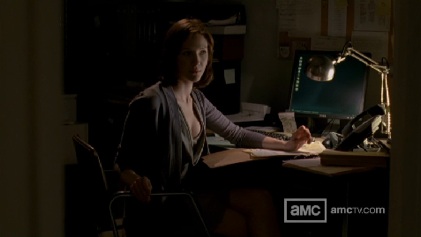 Jessica Collins as Maggie Young (Ep. 3)
Jessica Collins as Maggie Young (Ep. 3)


Will : You know what the biggest joke is here? It's my business, our business to tell people what to think. And the truth is, I have no idea what to think anymore.
David : About what?
Will : This. What we do.


Abonneren op:
Posts (Atom)


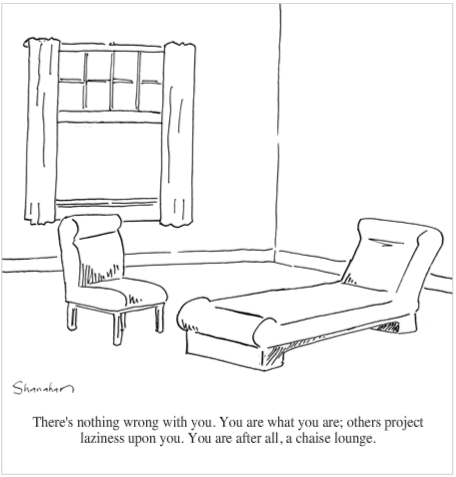








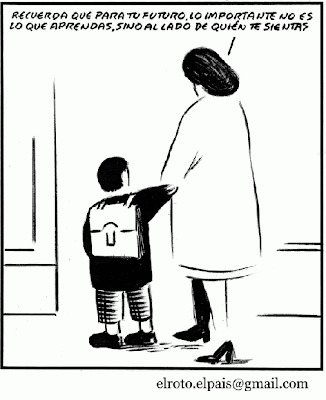
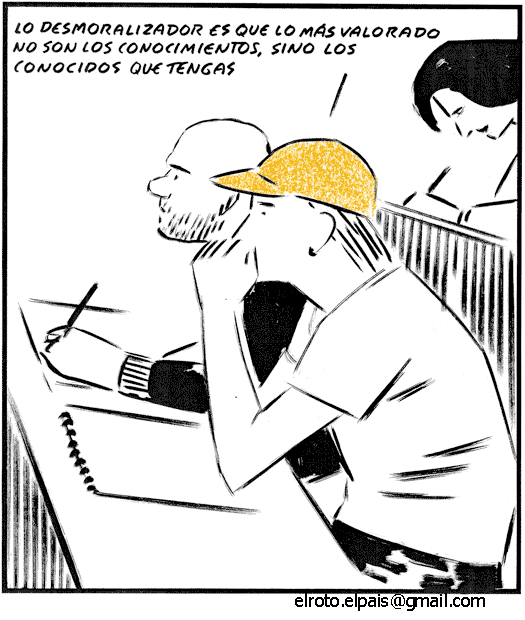














![Late Links:
White House to shirtless Obama photos: Drop dead.
Bikini Wednesday: Molly Sims and Stephanie Seymour.
Pretty In Print: Olivia Wilde in Men’s Health; Beau Garrett in Esquire; Rosario Dawson in Madame Figaro; Nicki Minaj in King.
Get To Know A Hottie: Susie Addison.
International Beauty of the Day: Min Soo Ah.
Where Are They Now: Lorena Bobbitt.
Most Dumbest Criminals of 2010.
Dlisted: Open Post: Hosted By Mah Boo’s New Glasses.
Filmdrunk: Uncharted Director to Mark Wahlberg: ‘NAWT YOU.’.
Copyranter: Woman without clothes used to sell notebook.
Nerve: Ridiculous Tips for a Miserable Sex Life: December.
Holy Taco: Attention Rappers, Twitter is Killing Your Street Cred!
Manofest: The 10 Greatest Moments In Celebrity Boob Jiggling History.
Late List: 50 guys we wish we were in 2010.
[photo: reddit.]](http://29.media.tumblr.com/tumblr_le7wlcMkOw1qzpwi0o1_r1_500.jpg)
